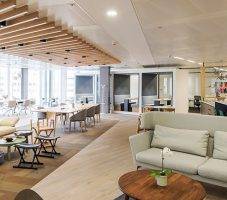September 26, 2016
Employers must adopt a trust based approach to flexible working 0
 Employers are being urged to create a more inclusive and flexible working environment for their employees by adopting a trust based approach which focuses on the meeting of objectives rather than hours. This is the advice of Harvard University’s Global Leadership award winner Charlotte Sweeney on the launch of National Work/Life Week. In 2015, 23 percent of employees were reported to be doing some of their work remotely, up from 19 percent in 2003 according to the Bureau of Labour Statistics. But more than just adopting agile working, the diversity expert says businesses should begin to focus on individual well-being and supporting employees to enrich all aspects of their lives, their families and their communities. Corporates should implement a trust-based approach, which focuses on employees meeting their objectives, rather than focusing on where they are actually doing the work or even how many hours it takes to complete.
Employers are being urged to create a more inclusive and flexible working environment for their employees by adopting a trust based approach which focuses on the meeting of objectives rather than hours. This is the advice of Harvard University’s Global Leadership award winner Charlotte Sweeney on the launch of National Work/Life Week. In 2015, 23 percent of employees were reported to be doing some of their work remotely, up from 19 percent in 2003 according to the Bureau of Labour Statistics. But more than just adopting agile working, the diversity expert says businesses should begin to focus on individual well-being and supporting employees to enrich all aspects of their lives, their families and their communities. Corporates should implement a trust-based approach, which focuses on employees meeting their objectives, rather than focusing on where they are actually doing the work or even how many hours it takes to complete.












 We are more susceptible to infection at certain times of the day as our body clock affects the ability of viruses to replicate and spread between cells, suggests new research from the University of Cambridge. The findings,
We are more susceptible to infection at certain times of the day as our body clock affects the ability of viruses to replicate and spread between cells, suggests new research from the University of Cambridge. The findings, 
 SMEs that neglect to offer flexible work options may find their employees decide to switch to somewhere that does, according to a survey from
SMEs that neglect to offer flexible work options may find their employees decide to switch to somewhere that does, according to a survey from 



















